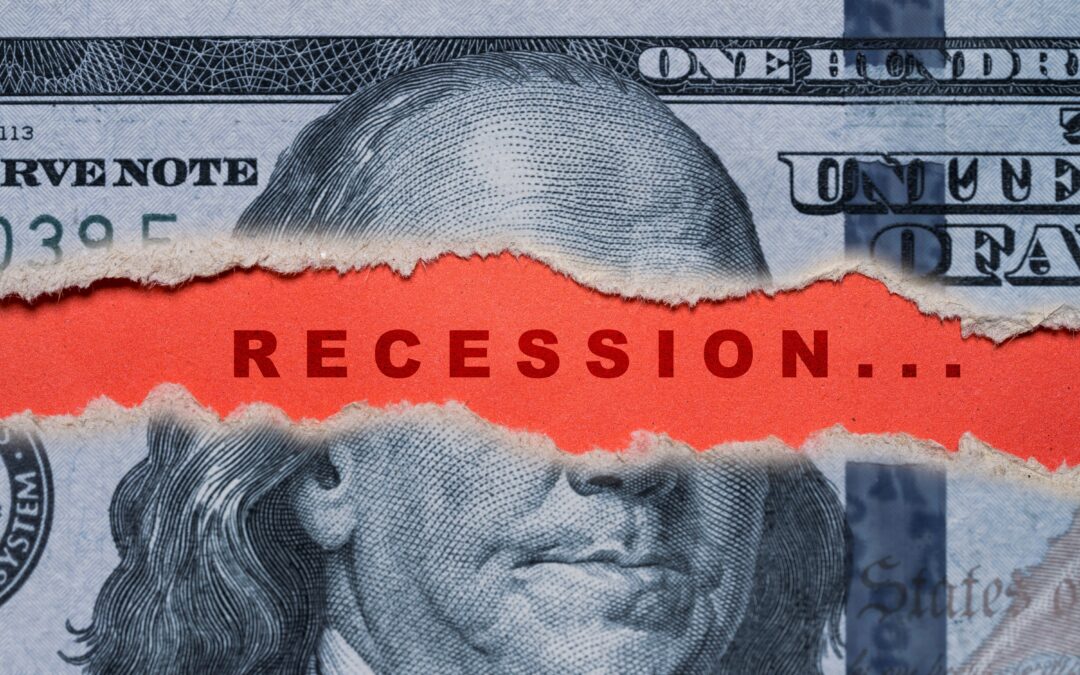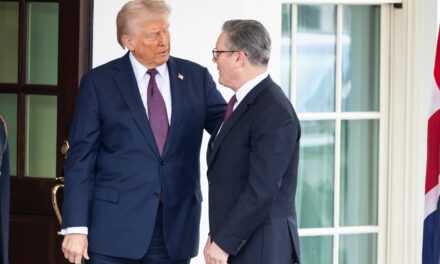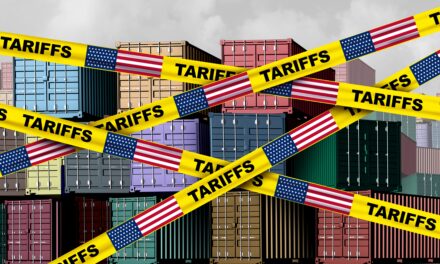Donald Trump’s announcement of sweeping reciprocal tariffs shocked the market and set the US economy on track toward an inevitable recession.
In today’s episodes, I’m sharing some insights on just how deep and long-lasting this recession might turn out to be (along with the recession-proof stock I’m currently adding to my own portfolio).
Click below to start watching:
I am Andrew Zatlin, and this is Moneyball economics. So let’s just jump into it, shall we?
Donald Trump has gone nuclear on global trade. He’s raised tariffs so precipitously high that it’s triggering devastation across the global supply chain and it’s leading America into a recession.
What’s not inevitable is how deep or how shallow the recession will be, and that’s what I want to talk about. So let’s explore some of the what’s and why’s…
There is a myth out there that America is prosperous.
We’re not prosperous.
We’re $32 trillion in debt, and to make it worse, we buy a lot more than we sell every year. Trillions of dollars more gets imported than we export, and that is just not sustainable.
Think of it this way, it’s like a brother-in-law. You go to his house, he’s got a fancy mansion, jet skis, ATVs, a lot of cars, all the bling, lots of travel, but you find out that he’s mortgaged to the hilt with two or three mortgages and he’s barely getting by. One bad moment and everything falls apart like a house of cards. That is the American economy.
We depend on everybody else giving us loans so that we can then turn around and buy more than we save and more than we sell. It’s just not sustainable.
And Donald Trump sees this, and he came in and he wants to change this. Well, there are a couple ways to change it. How do you import less and export more?
Well, one way is with a weaker dollar, and that’s something Donald Trump is a fan of. But that’s more indirect. Instead, he’s pursued a direct way, and that is to raise tariffs. Economic theory is going to say it’s good, it’s bad, whatever. We know historically raising tariffs can work. We did it on Japanese autos. Next thing you know, they’re building cars here, so there are some solid precedents for it working, shall we say.
The only question really is; why does Donald Trump like to go down the negotiation path that he goes down knowing full well it’s going to lead to a recession?
Donald Trump has acknowledged the recession’s coming, but he’s tried to deflect it onto Biden. Well, guess what? He’s delivered it himself and let’s sort of look at the three options that were open to him.
He came in saying he was going to go after our trading partners and try to negotiate better deals. No surprise there. He could have done it in one of three ways. He could have said, for example, I insist on it a lot of bluster and see where that takes us. It’s not Trump’s way, it’d be just bluster. The second path, which I thought he was going to pursue, and quite frankly, so did all the other experts, is something where there’s more bark than bite … but there’s definitely some bite, something to get everyone’s attention and get them to the negotiation table.
Something like just a 10% tariff with threats of more to come. Well, the reason I thought he would do that is because, quite frankly, that’s the only option out there that would not lead to economic blowback if he does raise tariffs.
Instead, he pursued option three, which is full-blown tariffs, which inevitably leads to a recession.
We’ll talk about why it’s inevitable that we have a recession because of tariffs, but suffice it to say taking this path means he is eyes wide open knowing he’s going to create a recession. Now, why would he do that right out of the gate in the early stages of his administration?
Well, I was wrong. I didn’t think he would, but in doing so, what he’s done is he’s created an interesting set of conditions whereby we get the recession now, rip the band aid off. By the time we start to see the positive consequences, the next presidential election is underway. We see that Vance or whoever’s running gets the benefit of a strong economic rebound and possibly a prosperity with a lot of legs. Okay, so I see Trump as being willing to accept a recession as the consequence, which means how deep a recession or how shallow is now up to what happens next.
Let’s talk about why recession’s inevitable, and then we can explore a little bit about what actions Trump can take to make it less recessionary.
We’re going to see a recession, quite frankly, for a couple of reasons. Number one, we got DOGE. Let’s start there. We are firing about 300,000 people in the federal government.
Well, guess what? Those are people who go out and they eat dinner, they buy cars, they spend money in the private sector, and they’re not going to spend as much money going forward. This is an impact that’s going to happen later in the year because severance packages and other things kind of push it out, but by the end of the year you’ve got 300,000 people out of work not spending money, and that’s just the public sector part.
The private sector portion is they’re also cutting contracts. Contractors are getting laid off. They don’t have jobs. This is easily another 50,000-100,000thousand workers.
All told between now and the end of the year, we’re probably going to see 400,000 people out of work and job hunting. That’s tens of billions of dollars not being spent in the economy, and then that has the multiplier effect. There are not buying as much Starbucks. They’re cutting gym memberships and so on and so forth. This in and of itself is recessionary, but there are two other headwinds.
Tariffs are inflationary. In the near term, you don’t really have substitute goods. It’s one thing to say long-term factories are going to come here and they’re going to produce, but right now if you had to buy a phone, you don’t have a lot of choices and so phone prices going up, all the import prices going up, you don’t have options.
If you have to buy, you’re going to buy and you’re going to spend more, which means you really have two options. You don’t buy … or you buy one thing and less of the other. And this is the impact of having higher prices is you have an impact on real income where people spend less.
The consumer is going to take a big body blow from this because stuff is just going to be more expensive. Semiconductors are in everything. People have to buy smartphones, they break, they have to buy computers. They break. That talking teddy bear that you’re going to get your five-year-old at Christmas time? It needs semiconductors and on and on and on.
Trump likes to talk a tough game. “Hey, don’t you dare raise prices!” These companies don’t really have a lot of choice. In fact, we’re already seeing some of this consumer pullback underway.
Advanced auto parts is hiring like you wouldn’t believe. They basically provide do-it-yourselfers with auto parts. Well, if you’re thinking about buying a car, but prices are going to go up a few thousand dollars, you might postpone that for a year. Stick with your car now, which means you got to go out and you got to get new spark plugs or whatever it is you’re going to need. You’ll do your oil changes yourself and so on and so forth. We’re already seeing households trade down and pull back buying new things.
The third reason we’re going to see a recession, and this is one that I think is maybe not well understood, is we got a reverse wealth effect. Donald Trump has single handedly crushed the stock market 15% and it could go down 20%. There’s a wealth effect that goes into a stock market going up and going down.
People who buy houses, who buy cars oftentimes look to their 401(k)s as a source of the down payment.
Well, guess what? You take 15% or 20% out of people’s portfolios. They’re not going to be rushing out to buy big ticket items. This is the beginning of home buying season. He has just put a stake through the heart of one of the most important engines of our economy, so we’ve got lots and lots of headwinds.
Donald Trump is also up against the clock. Look, I get it. I get why he’s trying to play like he’s got all the leverage in the world against our trading partners, forcing them to come to the table with big concessions. I get it. But to be honest, this is not an open-ended situation. He’s got 30 to 60 days because of what I just talked about with the 401(k) situation.
People are getting pissed off. You crush the middle class 401(k)s, you crush their savings. They remember that.
Now, Donald Trump might think he can in the next 30 or 60 days, relent show some kind of compromise with trading partners, and that’s certainly what he hopes to accomplish. But the reality is he’s also created a lot of uncertainty. There’s no trust right now in the American public when it comes to his economic policies.
That means no matter what happens in the next 10 days, he could come back with a lot of rewards, the concessions that he’s getting, just don’t matter. The American public has been burned. They don’t trust him. He could overnight change the scenario again, and so he has created less consumer spending this year, just it is what it is.
This is financial behavior. We’re entering recession. It will be super deep if he does not come up with a compromise in the next 30 to 60 days because vacations are underway.
Vacation spending, summer spending has already been budgeted. It’s what comes next. It’s the holiday season.
People are pissed off. They go away on vacation, pissed off, and the circumstances are the way they are game over for the US economy. He needs people’s votes. I’m hoping he may embrace a recession now, but I’m hoping that he recognizes that he’s actually risking the future election by pissing off the middle class.
Costco. That’s the one on my plate right now. I don’t own Costco. I need to own Costco because at the end of the day, they’re the ones who are going to be the beneficiaries of everybody trading down and looking for alternative cheaper goods.
Now anyway, folks, we’re in it to win it.
Zatlin out.

Andrew Zatlin
Editor, Superforecast Trader & Moneyball Economics





